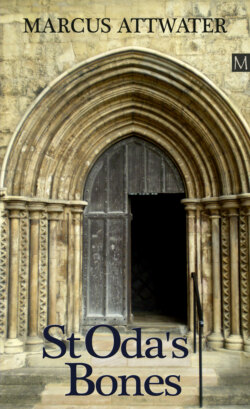Читать книгу St Oda's Bones - Marcus Attwater - Страница 4
На сайте Литреса книга снята с продажи.
1
ОглавлениеShe sits by the french windows, where the light is good for reading, but she is not reading now. Ten or twenty years ago she would have flung the book as far away from her as possible, to express the violence of what she feels. But stooping to pick things up is no longer to be undertaken lightly, and she can hardly let it lie there for the help to find in the morning. Of course, someone will have to find it, someday soon. She must make sure it is found, she realises that it is her responsibility now, her reading has made her complicit. But she recoils from the knowledge, she wants to pull away from the meaning of her husband's elliptic account. Does she wish herself back to ignorance? It is an impossible question she wastes no time on. Whatever she feels, she must act on what she knows. She will face the truth, and face its consequences, and she will not flinch. At least, she adds to herself, since she is fundamentally an honest woman, she will flinch only a little.
Until this afternoon, if someone had asked her - which no one has been either astute or impolite enough to do - she would have said that she had no illusions about her late husband. He was not a warm-hearted or compassionate man. He had no patience with the failings of others. But she would also have said he always acted as he believed to be right in the eyes of God. Perhaps even in this case he did? But her mind revolts at that thought. He must have known, however closely he guarded the knowledge from himself or from others, that what he had done was wrong. Not only a crime, but a sin. For decades of uneventful marriage she had been unable to reach the thoughts and feelings behind her husband's coolly respectable exterior. Now, unwelcome and unwanted, she knows him.
What will happen? If she does nothing, will the truth come out? She has made up her mind for herself, but she must think of the repercussions for others. What little amends are possible have to be made. There must be earthly justice as well as divine judgement. Thoughts swirl through her head: the sense of unfinished business which led her to examine the past, the diaries, her husband's dry account and the gaps in it - she has no particular memory of that night herself, though there must be others who have. She does not like to imagine one of her neighbours living for 30 years with the guilt which now sits so heavily on her, but there must be others who know. And they must be worried rather than horrified. For wheels have already been set in motion - by herself, unwittingly: the letter to the rector, the meetings of the PCC, the excavation, the coming celebrations and the bones, St Oda's bones…
The light is gone now. She gets up stiffly, replaces the book among its fellows. She draws the curtains, goes into the kitchen to heat a bowl of soup for herself, checks that the back door is locked. As she does things she has done a thousand times before, she realises she may be doing them for the last time. The awareness does not disturb her, it is restful. That feeling of things unfinished, incomplete, which has haunted her for months, is gone. There are only a few more things to be done. She will not take her knowledge to the impatient ears of the police, or the shallow concern of the present rector. She will not trouble the sympathy of her friends. There is no hurry, what has waited years can wait a few days more. She just has to make sure that what she knows will still be there when she is not. She will write to Eliot.
